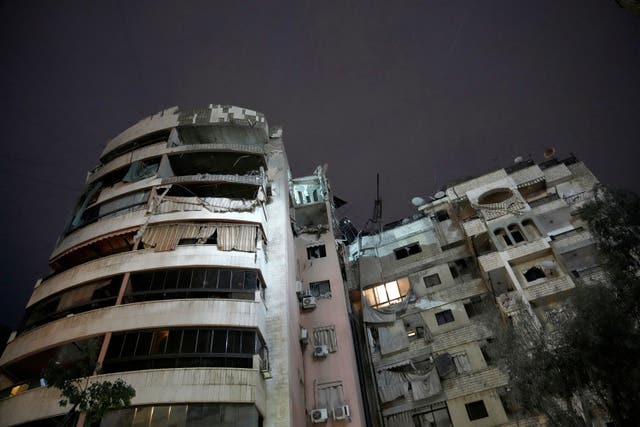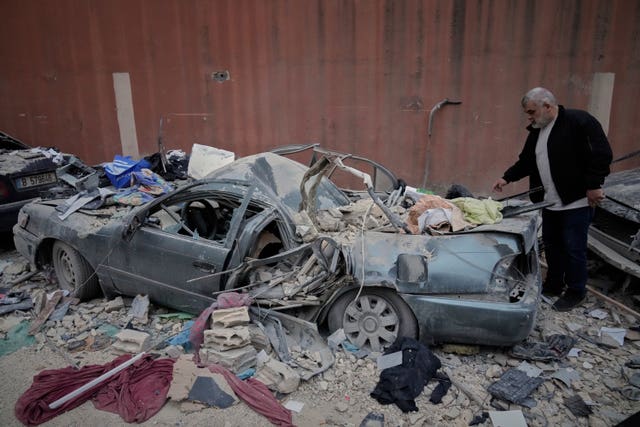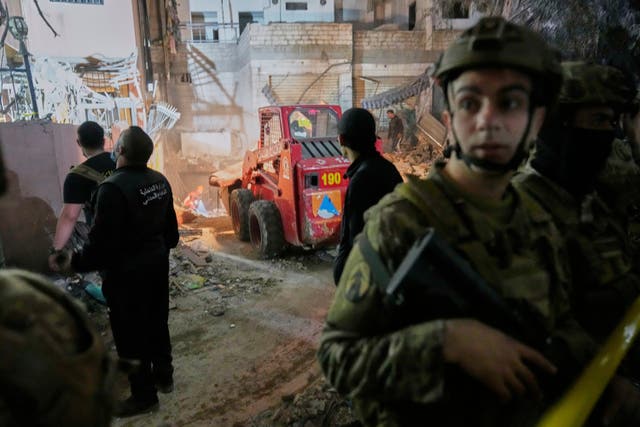At least four dead after Israel strikes building in southern Beirut
At least seven other people were wounded in Tuesday’s airstrike, according to the Lebanese Health Ministry.

At least four people are dead and a further seven have been left injured in the wake of airstrikes on Beirut’s southern suburbs, the Israeli Defence Force (IDF) confirmed on Tuesday.
The IDF said the targeted attack, which took place in the early hours of Tuesday morning, were focused on a building in the southern suburb of Dahiyeh, with the military targeting a member of the Hezbollah militant group in the attack.
The Israeli military had warned residents in the crowded suburbs before the attack after two projectiles were launched from southern Lebanon, which Hezbollah denied firing.
The airstrike came without warning days after Israel launched an attack on the Lebanese capital, Beirut, on Friday for the first time since a ceasefire ended fighting between Israeli forces and the Hezbollah militant group in November.

The Israeli military said in a statement that the latest strike targeted a Hezbollah member who had been helping the Palestinian Hamas group in the Gaza Strip in attacks against Israel.
It said the attack was “under the direction of the Shin Bet”, Israel’s domestic intelligence agency.
At least seven other people were wounded in Tuesday’s airstrike, according to the Lebanese Health Ministry.
Lebanese President Joseph Aoun condemned the airstrike.
“We must prevent any violation of sovereignty from abroad, or from infiltrators within who provide an additional pretext for aggression,” Mr Aoun wrote in a statement posted on X.
The former military chief vowed after his election in January that all weapons would be at the hands of the Lebanese state, indirectly referring to Hezbollah’s arms.
Photos and videos widely shared on local and social media showed the top three floors of an apartment building damaged following the strike. Piles of debris on cars below the building can be seen.

Jets were heard in parts of the Lebanese capital before the strike near the Hay Madi neighbourhood.
“We were at home. It was Eid al-Fitr,” said Hussein Nour El-Din, a resident in the neighbourhood, referring to the Islamic holiday that marks the end of the holy month of Ramadan.
“We didn’t know where it happened, but once the smoke cleared, we saw it was the building facing us.”
During Israel’s last war with Hezbollah, Israeli drones and jets regularly pounded the southern suburbs, where Hezbollah has wide influence and support.
Israel sees the area as a militant stronghold and accuses the group of storing weapons there.
The leader of Lebanon’s Hezbollah group, Sheikh Naim Kassem, warned on Saturday that if Israel’s attacks on Lebanon continued and if Lebanon’s government did not act to stop them, the group would eventually resort to other alternatives.

Under the US-brokered ceasefire that ended the 14-month Israel-Hezbollah war, Israeli forces were supposed to withdraw from all Lebanese territory by late January, while Hezbollah had to end its armed presence south of the Litani River along the border with Israel.
Israel has launched daily strikes in southern and eastern Lebanon since the US-brokered ceasefire went into effect, saying it targets Hezbollah officials and infrastructure.
The Lebanese military has gradually deployed in the country’s southern region, and Beirut has urged the international community to pressure Israel to stop attacks and withdraw its forces still present on five hilltops in Lebanese territory.





